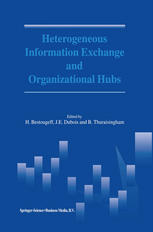

Most ebook files are in PDF format, so you can easily read them using various software such as Foxit Reader or directly on the Google Chrome browser.
Some ebook files are released by publishers in other formats such as .awz, .mobi, .epub, .fb2, etc. You may need to install specific software to read these formats on mobile/PC, such as Calibre.
Please read the tutorial at this link: https://ebookbell.com/faq
We offer FREE conversion to the popular formats you request; however, this may take some time. Therefore, right after payment, please email us, and we will try to provide the service as quickly as possible.
For some exceptional file formats or broken links (if any), please refrain from opening any disputes. Instead, email us first, and we will try to assist within a maximum of 6 hours.
EbookBell Team

4.3
8 reviewsHelene Bestougeff, Universite de Marne Ia Vallee, France Jacques-Emile Dubois, Universite Paris VII-Denis Diderot, France Bhavani Thuraisingham, MITRE Corporation, USA The last fifty years promoted the conceptual trio: Knowledge, Information and Data (KID) to the center of our present scientific technological and human activities. The intrusion of the Internet drastically modified the historical cycles of communication between authors, providers and users. Today, information is often the result of the interaction between data and the knowledge based on their comprehension, interpretation and prediction. Nowadays important goals involve the exchange of heterogeneous information, as many real life and even specific scientific and technological problems are all interdisciplinary by nature. For a specific project, this signifies extracting information, data and even knowledge from many different sources that must be addressed by interoperable programs. Another important challenge is that of corporations collaborating with each other and forming coalitions and partnerships. One development towards achieving this challenge is organizational hubs. This concept is new and still evolving. Much like an airport hub serving air traffic needs, organizational hubs are central platforms that provide information and collaboration specific to a group of users' needs. Now companies are creating hubs particular to certain types of industries. The users of hubs are seen as communities for which all related information is directly available without further searching efforts and often with value-added services.